Each character entry below contains a ≤1 MB QuickTime movie of the character being painted with a brush, created by Prof. Saeko Komori of Chubu University. Please see the JP Net Kanji Project for more details.
In the following definitions, on (Chinese-based) readings are represented by katakana, and by capital romaji letters; kun (native Japanese-based) readings are represented by hiragana, and by lower-case romaji letters. This is a common dictionary convention, and does not have any bearing on meaning.
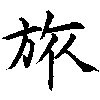
Video: Writing and pronunciation
Printed form: 旅
Readings: リョ RYO
Meaning: travel
Mnemonic:
Directions 方 and people イ in three different positions.
Usage Examples:
旅行 (りょこう) travel
旅館 (りょかん) Japanese-style inn
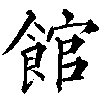
Video: Writing and pronunciation
Printed form: 館
Readings: カン KAN
Meaning: hall
Mnemonic:
A government hall for officials 官 to eat 食.
Usage Examples:
図書館 (としょかん) library
大使館 (たいしかん) embassy
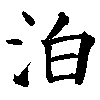
Video: Writing and pronunciation
Printed form: 泊
Readings: と(まる)/ハク to/HAKU
Meaning: to lodge
Mnemonic:
You should stay at an inn where bath and meal 白 are provided.
Usage Examples:
泊まる (とまる) stay (overnight)
一泊 (いっぱく) one night (of stay)
二泊三日 (にはくみっか) three-days trip
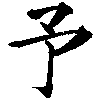
Video: Writing and pronunciation
Printed form: 予
Readings: ヨ YO
Meaning: previous; preparatory
Mnemonic:
マ and ア. Say "Ma!" [野 (の) "field"]
Usage Examples:
天気予ほう (てんきよほう) weather forecast
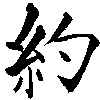
Video: Writing and pronunciation
Printed form: 約
Readings: ヤク YAKU
Meaning: promise
Mnemonic:
A bait 勺 on the line 糸. [紙 (かみ) "paper"]
Usage Examples:
予約 (よやく) reservation
約そく (やくそく) promise
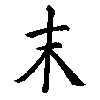
Video: Writing and pronunciation
Printed form: 末
Readings: マツ MATSU
Meaning: end
Mnemonic:
Big branches on a full-grown tree. 未 as in 妹 is a small branch on a not-yet-grown tree.
Usage Examples:
週末 (しゅうまつ) weekend
月末 (げつまつ) end of a month
年末 (ねんまつ) end of a year
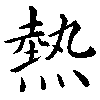
Video: Writing and pronunciation
Printed form: 熱
Readings: あつ(い) atsu
Meaning: heat
Mnemonic:
Hot kiln 火 at the bottom, round 丸 and made of layers of clay 土. [赤 (あか) "red"; 黒 (くろ) "black"]
Usage Examples:
熱い (あつい) hot (to touch)
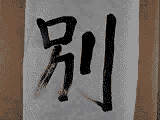
Video: Writing and pronunciation
Printed form: 別
Readings: ベツ BETSU
Meaning: separate
Mnemonic:
Cutting up an animal on the left with a knife on the right. [利 (り) "profit"]
Usage Examples:
別々 (べつべつ) separate
別に (べつに) not especially
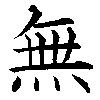
Video: Writing and pronunciation
Printed form: 無
Readings: ム MU
Meaning: non-
Mnemonic:
A pile of things burned 火 to nothing.
Usage Examples:
無理 (むり) impossible
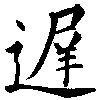
Video: Writing and pronunciation
Printed form: 遅
Readings: おそ(い) oso
Meaning: late
Mnemonic:
That sheep 羊 in the store 屋 is expensive and slow to sell.
Usage Examples:
遅い (おそい) late
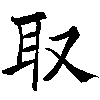
Video: Writing and pronunciation
Printed form: 取
Readings: と(る) to
Meaning: to take
Mnemonic:
Ear 耳 and hand 又 symbol. Don't pull my ear!
Usage Examples:
取る (とる) take
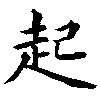
Video: Writing and pronunciation
Printed form: 起
Readings: お(きる) o
Meaning: to get up
Mnemonic:
Put oneself 己 in the motion of running 走.
Usage Examples:
起きる (おきる) get up
起こす (おこす) wake up someone
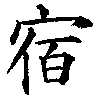
Video: Writing and pronunciation
Printed form: 宿
Readings: シュク SHUKU
Meaning: lodging
Mnemonic:
Under the roof 宀 there are hundred 百 people イ. [安 (やす) "cheap"; 家 (いえ/か) "house"; 寒 (さむ) "cold"; 宅 (たく) "residence"]
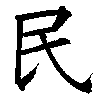
Video: Writing and pronunciation
Printed form: 民
Readings: ミン MIN
Meaning: people
Mnemonic:
A group 口 of clans 氏.
Usage Examples:
民宿 (みんしゅく) tourist home
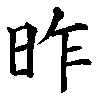
Video: Writing and pronunciation
Printed form: 昨
Readings: サク SAKU
Meaning: last; past
Mnemonic:
The day 日 already made 作.
Usage Examples:
昨日 (さくじつ/きのう) yesterday
昨年 (さくねん) last year
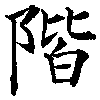
Video: Writing and pronunciation
Printed form: 階
Readings: カイ KAI
Meaning: floor; stairs
Mnemonic:
Everybody 皆 goes up and down these stairs.
Usage Examples:
三階 (さんがい) third floor
地下一階 (ちかいっかい) the first basement
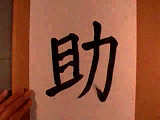
Video: Writing and pronunciation
Printed form: 助
Readings: たす (かる) tasu(karu)
Meaning: help; aid; assistance
Usage Examples:
助けて! (たすけて) Help!
助手 (じょしゅ) assistant
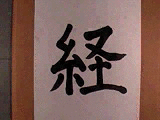
Video: Writing and pronunciation
Printed form: 経
Readings: ケイ KEI
Meaning: pass; go; through
Usage Examples:
経済(けいざい) economy
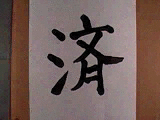
Video: Writing and pronunciation
Printed form: 済
Readings: ザイ/ す (む) ZAI / su(mu)
Meaning: relieve; help; end; finish; repay
Usage Examples:
食事を済ませる (しょくじをすませる) finish meal
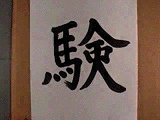
Video: Writing and pronunciation
Printed form: 験
Readings: ケン KEN
Meaning: effect; test; examine
Usage Examples:
経験 (けいけん) experience
実験 (じっけん) experiment
New Readings
| KANJI | READINGS |
|---|---|
| 多分 | (たぶん), probably |
| 洋間 | (ようま), Western-style room |
| 気持ち | (きもち), feelings |
| 回す | (まわす), transfer |
| 回る | (まわる), go around |
| 気が付く | (きがつく), notice |
| 気を付ける | (きをつける), pay attention |
[Quizzes (JavaScript required): Meaning (33 questions) | Reading (19 questions)]
